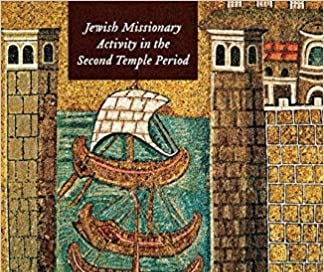My fifth book was called Crossing Over Sea and Land: Jewish Missionary Activity in the Second Temple Period. Here’s the blurb:
What was the extent and nature of Jewish proselytizing activity amongst non-Jews in Palestine and the Greco Roman diaspora leading up to and during the beginnings of the Christian era? Was there a clear missional direction? How did Second Temple Judaism recruit converts and gain sympathizers? This book strives to address these questions, representing an update of the discussion while also breaking new ground. A "source book" of key texts is provided at the end.
What happened was this. My PhD thesis was about Jesus and the Gentile Mission (i.e., book # 1), enquiring how the Jewish Jesus and his Jewish followers created a prophetic renewal movement that eventually became a Gentile religion with a solid missionary ethos. Of course, the question behind the question is what did Jews think about Gentiles? Was there already a Jewish missionary movement prior to Christianity? We know that there were various “God-fearers” (i.e., Gentile attracted to Judaism and who adopted some Jewish practices) and “proselytes” (i.e., Gentiles who converted to Judaism, which for males, meant circumcision). Did Jews actively seek out Gentile converts, or were they just happy to receive them if they showed up? There’s plenty of stuff on Josephus about this, see here, as well as this enigmatic verse in Matthew’s Gospel which is suggestive of something:
Woe to you, scribes and Pharisees, hypocrites! For you cross sea and land to make a single convert, and you make the new convert twice as much a child of hell as yourselves.(Matt 23:15).
So the debate is whether or to what degree Jewish missionary activity paved the way for the Christian mission to Gentiles.
There are folks like Scot McKnight arguing that most Jews were not normally missional in ethos, and folks like John Dickson who suggested that there was a deliberate intent to promote Judaism among Gentiles - both guys are good friends of mine.
This book started out as a 25K chapter that my supervisor told me to cut out of my PhD thesis. It felt like cutting of a limb, so I decided later to take those off-cuts, buff them up, fill them out, and turn them into a prequel to my PhD thesis. It was published with Hendrickson and then taken over by Baker Academic.
The book didn’t make a big splash cause it's a niche topic, but it is now one of the go-to-books for when anyone writes about Jews, Gentiles, and Conversion.
This was a book that certainly help me understand that studying early Christianity is not just the study of theological ideas, you need to understand ancient religion, and the sociology of ancient religion. So I benefitted from it that way.





I totally agree with your concluding statement: "This was a book that certainly helped me understand that studying early Christianity is not just the study of theological ideas, you need to understand ancient religion, and the sociology of ancient religion." Your works have been particularly helpful to me in understanding New Testament backgrounds which I strongly believe is fundament to a proper interpretation of the biblical text. As a side note, I just read Matthew 23:15 yesterday and wondered about the missional activity of the Pharisees.